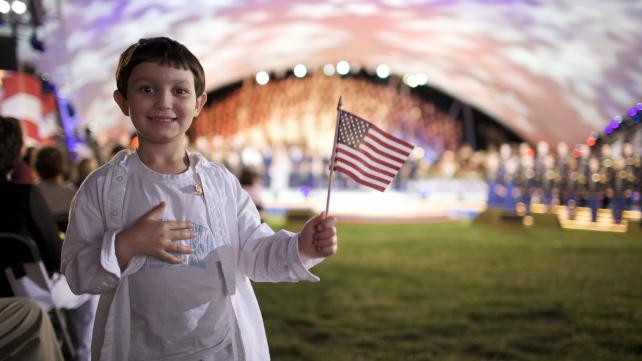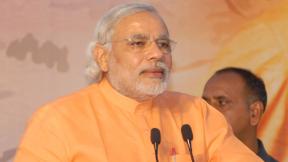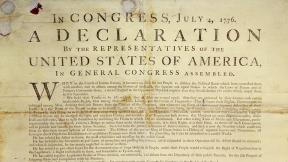
The Fourth of July commemorates America's independence from England. The event is celebrated with much fanfare, fireworks, and festivity. But it's also an important time to remember the many blessings that God has given this country and how we are benefiting from them. This Fourth Of July, enjoy the spirit of liberation by improving the America you love with these activities:
1. Liberate yourself from fear
Fear has become an industry. Fear diminishes our capacity to properly think. So connect to sources of strength and learn to be free from fear and anxiety. Let's touch our neighbors instead of fearing them.
2. Learn about the sources of liberty
Remember the book The Little House on the Prairie by Laura Ingalls Wilder? Well, Rose Wilder Lane, who is Wilder's daughter and editor of the Little House on the Prairie, has a written a beautiful book called "Sources of Freedom: Man?s Struggle Against Tyranny." Read it. You will be surprised when you discover some of her findings.
3. Fight the extremists in the community
Extremists are not necessarily terrorists, but they do represent an intolerant streak amongst the human beings. Extremists include those who bully others verbally and otherwise.
To fight extremists in the Muslim community, I suggest the following:
- Have your Masjid and its members sign the "Not in the Name of Islam" petition.
- Although I have not found any Imam preaching the gospel of civilian killings, this unIslamic practice needs to be countered with forceful arguments.
- Develop a Muslim Diversity Kit or at least some Khutbas, workshops and lesson plans which highlight Islamic teachings of racial harmony, diversity of Islamic practices, the wisdom of interfaith relations, the blessings of Shura, etc.
- Make your Masjids more welcoming to non-Muslims.
- Respect the rights of extremists to free speech without allowing them to force their opinions regarding women's participation and other issues on other Muslims.
- Demonstrate in front of those few mosques that do not make space for women.
To fight extremists in the Christian community, it is important to emphasize:
- Teachings of neighborly relations towards the "other".
- Bringing "others" to offer a series of Sunday adult classes with themes that enhance our knowledge of others and the world.
- Encouraging congregations to take zero tolerance positions in their realms of influence towards bigotry, intolerance and racism.
- Teaching that true patriotism defies the "my country right or wrong" attitude.
- ontrast peaceful living among nations as compared to the American neoconservative agenda.
Sincerity, wisdom and commitment, as well as a heavy dose of patience will be needed to deal with extremists within the community.
4. Devote Masjid/Church resources to bridge building
Budgets normally tell the truth about priorities. Convince your Board of Directors to allocate a good portion of its budget to bridge building and outreach. America is increasingly a divided place: pro- and anti-war activists don?t talk to each other; the pro- and anti-Bush camps avoid each other; immigrant and non-immigrant neighbors live next to each other but on an island of their own.
Religious communities can play an important role in facilitating dialog and action across these drawn lines. But how much have we allocated in terms of our resources for this intra-faith and inter-faith dialog, enhancement of this network, communication, and activity?
5. Speak for America
No one will be heard as loud and clear as a Muslim speaking for America. Not as a person sent by the US government but as an individual citizen. The world is not listening to America, but it is highly likely that it will listen to Muslim Americans.
It is important to explain the following things and adopt the following practices when communicating with the world:
- how you and your neighbor live. Not every American is an embodiment of American foreign policy as they may not be the responsible for everything their government does.
- Eighty million Americans did not even support the war on Iraq and a majority now realizes that they were misled. America?s ideals of freedom allow anti-war activists, including Muslims, to demonstrate against the war while it was being fought.
- admit the negatives about our history, such as the treatment of Native Americans and African slaves brought to this continent. But also mention that Americans are not proud of this aspect of their past and that American children learn these facts in school history classes. Hollywood does not represent the lifestyle of the majority of Americans.
- Explain how America helped stop genocide in Bosnia when the Muslim world and the Europeans were not doing much about it.
- There are six million Muslims in America. This includes about two million Americans who have accepted Islam as their faith.
- Although life after 9/11 was extremely difficult for Muslims, many, many Christians came out in support of Muslims during the harrowing days after the tragedy.
Your will be more successful if you make it clear to your audience that you are not defending the American government and its policies. Rather, you are talking about America and its people.
6. Fight the Demonization of America
If you are a Muslim American, you probably know what demonization means. While Muslims have been victimized and stereotyped in the United States, Americans have also been so in the Muslim world. This is where Muslim Americans can play a positive role.
If you'll be visiting a Muslim country this summer, make a point of speaking out against stereotyping. For example, mention how Americans expressed horror and disgust about the abuse discovered at Iraq's Abu Ghraib prison. Also remind those you meet about all of the positive medical and scientific developments and research that are benefiting humankind, not just Americans. In this sense, America is not just important for Americans, but for the rest of the world as a leader in research and development.
7. Speak out Against Terrorism
In a Karachi mosque, when I sought permission to take photos of the Masjid for my children in the US, attendees invited me to speak to their congregation after prayers. I chose to speak about the American journalist Daniel Pearl who was kidnapped and murdered by the terrorists in Karachi. As I spoke about his wife, their child who will never see his father, and Pearl?s wife's desire to raise her son as a bridge-builder, I saw tears in the eyes of the old and young Muslims in that mosque, which had a Madrassa attached to it.
Muslims form the largest number of refugees in the world. They are the victims fleeing their lands for a peaceful life. We should have been the first to speak out against terrorism. Although all Muslim governments are supporting the "American" war on terrorism, this war has no chance of success, since the Muslim masses do not support it. They will however become allies if they are no longer considered merely "collateral damage" and we make an effort to reach out to them. When we will understand their pain, they will understand our pain.
8. Commit to working with fellow Americans who care
In a recent thinking retreat, I met an African-American man who had been on death row for 20 years and was recently freed after DNA evidence proved he was innocent of the crime he was accused of. This individual said that when he saw the photos from the Abu Ghraib prison scandal, he thought they were from the prison he had been in in North Carolina. Only a few stories in the American media have connected what goes on in our prison system of two million people with the torture at Abu Ghraib.
Aligning with this maligned African- American man and others like him for the greater good is critical for Muslims. We must commit to working for justice in all quarters to make America great and good.
9. Volunteer For America
Choose a cause that interests you to help America.
- If you deeply care for the state of civil liberties in our country volunteer for organizations like the American Civil Liberties Union (www.ACLU.org) that fights for civil liberties in the United States.
- If you concerned about poverty, find out what you can do for organizations like America's Second Harvest.
- If you care about the problem of homelessness, consider this: one-third of them are American war veterans. You may even want to work with veterans against homelessness.
- If you want to keep television programs fit for children's consumption, then the Parents TV Council is an excellent organization to join.
10. Freedom to Vote
Remind yourself of the freedom you have to vote this Fourth of July. And don't forget to exercise it later this year. Remember that millions of people the world over have little to no say in the affairs of the state, and God has blessed you with this right in America. Use your vote and encourage others to do the same.
11. Religious Freedom
Some Muslims feel that we must celebrate nothing except religious Islamic holidays. They don't celebrate their birthdays or any other days. If you believe this, then this Fourth of July, thank God that you live in a country where your freedom to practice your religion, and in particular, your understanding of not celebrating anything other than religious holidays, is also protected.








Comments
Automatically when most Muslims hear a celebration other than Eid is to take place, most I've encountered think the celebration will be Haram. But if we think about how we are to "celebrate" anything, we do it by remembering Allah, offering Salah, and giving dawa. I do not see why 4th of July has to be any different; and furthermore, I am pleased that you reminded us of and gave a few pointers on HOW we can "celebrate" this holiday AND reminding us that living in America and having that freedom to choose what to celebrate or worship is something for which we need to show Allah gratitude by fighting the Shaytan ,oppression, and ignorance -wherever it may surface- with our hearts, with our words, and with our hands. Jazakallah khair
Location
I only have one issue with this article. You called the Africans who came to America "slaves" they were brought to be slaves, they are/were PEOPLE, not SLAVES. The wording implies that they were born to be slaves and that is how many think of us but were were enslaved by those who wanted to use us to build America. Please reconsider your terminology. Thanks As salaam alakum.
Location
Add new comment